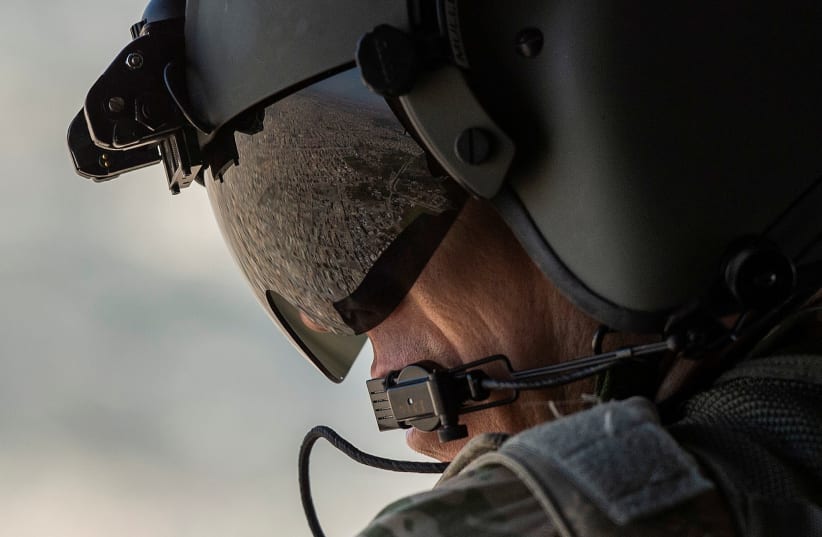With so much belligerent rhetoric and some saber rattling between the Islamic Republic of Iran and the United States – for example, the announced arrival of the US aircraft carrier to the Gulf area – it is not surprising that many analysts seek to forecast what will happen if war breaks out between them.
If the Iranians have their way, they will make sure that tensions fall far short of war.
Iran’s leaders are certainly belligerent toward their neighbors, with clear ambitions to dominate areas far beyond Iran’s borders in Lebanon, Syria, Iraq and Yemen, but they have hardly ever been reckless.
Preying on their minds when they contemplate the cost of war with the US – the leading military power in the world by far – is Operation Praying Mantis, an operation that the US Navy undertook against the navy of the Islamic Republic during the Iraq-Iran war in April 1988.
Retaliating against Iranian attacks to disrupt Gulf oil shipping, the US Navy in a single day of battle sank an Iranian frigate, a gunboat, three speedboats, two moving platforms and damaged a second frigate at the cost of 55 Iranian lives. The US Navy’s losses amounted to two helicopter crew members, after the helicopter, on reconnaissance, malfunctioned and crashed into the sea.
Even more nightmarish for the Iranian leaders is what occurred in 2003 with the allied conquest (led overwhelmingly by US forces) of Iraq.
The subsequent difficulties of staying in Iraq to rebuild the Iraqi state have overshadowed one of the greatest military successes in the history of warfare.
The US military, with minor help from allies, conquered a state the size of Poland in less time than the German blitzkrieg against that country, at the cost of 157 lives (122 of them, US military personnel). Thousands of losses had been contemplated.
These leaders know only too well that their forces, by contrast, engaged the Iraqis in warfare for seven years without achieving any decisive results. It takes simple deductive reasoning to realize the outcome of a war against the US.
They also realize that because Iran as a state is so vulnerable, the US will hardly need forces on the ground to bring it to its knees.
Not only is Iran dependent on one type of export to foot government bills – oil and gas exports account for between 40% and 60% of government revenue (depending upon the fluctuating price of energy) – over 80% of these energy exports are shipped out of one port, Kharg Island, on the Iranian side of the Arab Gulf. One can be assured that the US deploys cruise missiles aimed at this small island to knock out a part, or all, of this 3-sq.m. complex.
How effective would these cruise missiles be? If cruise missiles launched from Europe or navy ships in the area have been able to target and kill al-Qaeda terrorists in jeeps traversing deep gorges in the mountains of Yemen, they certainly can target a level, static site any novice can find on Google Earth.
Should a single attack or successive attacks on Kharg Island fail, the US could always strike at Iran’s second vulnerable nodal point – Bandar Abbas, its biggest port on its southern coast.
To strike at Kharg Island is to strike at Iran’s financial lifeline; to strike at Bandar Abbas is to strike at its imports. Nearly four-fifths of container imports of the country run through this port. Container imports are those finished goods – cars, trucks, apparel, electronics – countries import that make the difference between living in the 21st century or in the 19th. Once again, there is little chance of missing the target, of failing to cause massive, if not total, damage.
Perhaps the greatest vulnerability facing Iran’s leaders lies in the vulnerability gap between Iran and the US. While the US can devastate Iran, Iran can only punish its allies, not the US itself. The few thousand US military personnel in Qatar and Bahrain are protected by Patriot missiles and, one can assume, appropriate underground shelters.
Given the US’s bounty of shale oil and gas, the ayatollahs do not possess, as the shah did, the oil card. And certainly the present president of the United States would be less sensitive to European concerns over rising energy prices. The European states have not been so sensitive to Trump’s concerns on the Iranian issue such that it would justify reciprocal empathy for their interests.
IRAN, ONE could argue, could order Hezbollah into action against Israel, to launch its massive arsenal against the small state. Once again, from the US’s perspective, the risk would be to Israeli, not American, lives.
Giving Hezbollah the green light would hardly be a wise Iranian move. The Israeli establishment, and even more so Israel’s military brass, has been highly reluctant since the war with Hezbollah in 2006, to engage in a full-scale ground offensive in Lebanon and possibly Syria. This reluctance, however, would totally dissipate in a scenario that involved Iranian belligerence against both the US and Israel, not least because Israel would feel compelled to demonstrate its loyalty to its American ally. In such a scenario, Israelis along the entire political spectrum would be willing to pay the human and economic price of a total offensive against Hezbollah, with predictable consequences – the destruction of Iran’s staunchest non-state ally.
No, the Iranians will avoid war at all costs, sticking instead to the proven strategy of acting through proxies to undermine Arab state order. This strategy takes time. Hopefully, the US economic sanctions will deny Iran the time it takes through massive economic hardship.
The writer is a professor and senior research associate of the Begin-Sadat Center for Strategic Studies, Bar-Ilan University.
